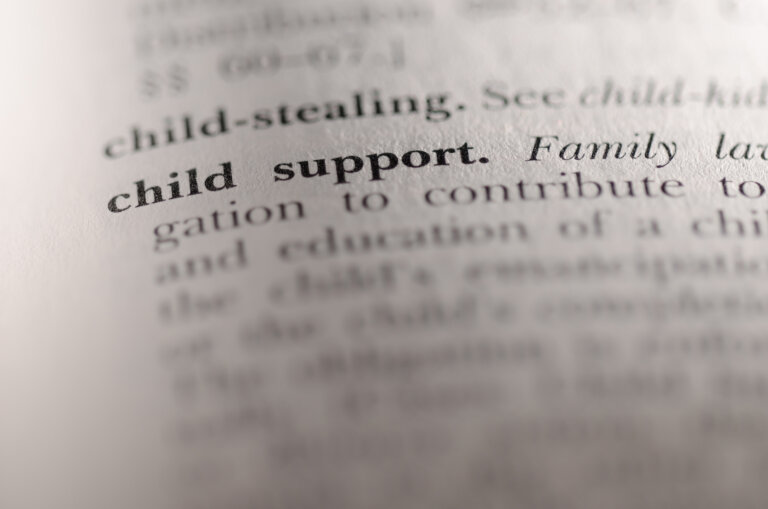Child Support in Divorce
When parents decide to divorce or separate, one of their most important considerations is the welfare of their shared minor children. Child support is a legal mechanism designed to ensure that parents continue to meet their children’s financial needs despite the change in family structure. In Virginia and Maryland, the law requires both parents to contribute to the financial support of their children.
The Role of Child Support in Family Law
Child support plays a critical role in family law. It ensures that children maintain a stable lifestyle, even when their parents are no longer together. Both Virginia and Maryland calculate child support based on several factors, including the income of both parents, the number of children, and the costs of healthcare and daycare. The primary goal of any child support order is to minimize the economic impact of divorce or separation on children.
Judges often emphasize the importance of child support during divorce proceedings. They ensure that all agreements comply with state guidelines and serve the best interests of the children involved. In this way, child support provides a bridge that helps children transition through their parent’s divorce more smoothly.
Separation of Child Support from Divorce Proceedings
It is essential to understand that child support and divorce proceedings, while related, are separate legal matters. In both Virginia and Maryland, you can address child support as a stand-alone issue. This means parents can initiate and resolve child support matters before finalizing their divorce. This approach allows parents to arrange immediate financial support for their children, regardless of their marital status.
Furthermore, adjusting child support is possible if a parent’s financial circumstances change significantly. Parents can work with the courts to ensure that child support orders remain fair and appropriate, given each parent’s current financial situation. By treating child support as a separate matter, state laws aim to protect children’s welfare consistently and effectively, regardless of the parents’ relationship with each other.
The Basics of Child Support
raising their children after a separation or divorce. This financial support ensures that parents can meet their children’s daily needs, including food, housing, clothing, education, and medical care. In Virginia and Maryland, statutory laws determine how courts calculate these payments to ensure they are fair and adequate.
Overview of Child Support in the Context of a Divorce
Determining child support is a critical step in any divorce case involving children. An effective child support arrangement ensures children remain financially secure despite their parents’ split.
The process of calculating child support obligations begins with assessing each parent’s financial resources and their children’s needs. Courts use a formula to decide how much a noncustodial parent should pay the custodial parent. This formula considers each parent’s income, the number of children, and specific costs like health insurance and daycare.
Child support payments typically last until a child reaches adulthood or graduates from high school, depending on state laws. Knowing what to expect in terms of child support is crucial for parents going through a divorce. This understanding enables parents to plan their financial futures and secure stable environments for their children. Courts strictly enforce these payment obligations, and failure to comply can result in severe legal consequences.
How Child Support Differs from Spousal Support
While both child support and spousal support involve one ex-spouse making financial payments to the other after a divorce, their purposes are distinctly different. Child support exclusively addresses the needs of the couple’s children. Its purpose is to prevent children from suffering due to a lack of financial resources following their parents’ separation. On the other hand, spousal support aims to allow a former spouse to maintain a lifestyle similar to what they had during the marriage or to help them become financially independent.
Child support payments are mandatory and have clear calculation guidelines under the law. These payments prioritize the children’s welfare and are not tax-deductible. Spousal support, however, can vary greatly depending on the duration of the marriage, the earning capacity of each spouse, and other marital circumstances. Unlike child support, spousal support can be tax-deductible, depending on the conditions of the divorce settlement.

Calculating Child Support
Calculating child support involves using a specific formula that ensures both parents contribute to their children’s financial needs based on their ability to pay. In Virginia and Maryland, these formulas take into account several key factors, such as each parent’s income and the custody arrangements. By applying these factors, the formulas determine a fair amount that one parent must pay the other to ensure they can adequately cover their children’s expenses.
Factors Influencing Child Support Amounts
Several factors can influence the amount of child support a court might order one parent to pay the other. The primary factors include each parent’s income, the number of children they have together, and their custody arrangement. In this context, income includes wages, bonuses, and other earnings from both parents. A greater number of children generally means higher child support payments because more resources are necessary to care for each additional child.
Other essential factors in child support calculations include the cost of each child’s healthcare, education, and special needs. If a child has specific medical conditions or educational requirements, the parents’ support obligations might increase to cover these expenses. The amount of time the child spends with each parent also affects their respective support obligations. For instance, if one parent has the children most of the time, the other parent might need to pay more in support to account for costs the first parent accrues during their custody.
Understanding the Calculation Process
The child support calculation process begins with gathering complete financial information from both parents. This information allows courts to determine each parent’s ability to contribute financially to their children’s needs. Courts then apply the state’s child support guidelines to this data. These guidelines aim to calculate fair and consistent support amounts that reflect each child’s best interests.
After calculating the basic support amount, courts might consider additional expenses such as daycare, school costs, and medical expenses. Parents usually split these costs in proportion to their incomes. Once the court determines the final amount, it issues a child support order. This order is legally binding, and parents must comply or face legal consequences. However, parents can ask the courts to review child support orders if their incomes or their children’s needs change significantly.
Custody and Child Support
Custody arrangements play a significant role in determining child support payments. When courts decide on child support in divorce cases, they carefully consider where and with whom the children will live. These decisions aim to ensure that support payments reflect the children’s living arrangements and meet their needs, maintaining their standard of living as much as possible after the parents separate or divorce.
Custody Types and Their Impact on Child Support
Custody impacts child support calculations significantly and comes in two forms: physical and legal. Physical custody determines where the children primarily reside. In sole physical custody arrangements, children live with one parent most of the time. This parent (the custodial parent) typically receives child support from the noncustodial parent to help them cover the higher costs they incur for day-to-day care. In joint physical custody arrangements, children spend substantial time with both parents. This often results in a lower child support obligation for the higher-earning parent, reflecting their shared responsibility for the children’s expenses.
Legal custody involves a parent’s authority to make major decisions about their children’s lives, such as education, health care, and religious upbringing. Whether legal custody is sole or joint does not typically affect child support calculations directly but can influence the overall approach to parenting responsibilities. The goal of child support arrangements is always to balance the parents’ financial contributions so the children’s standard of living does not suffer due to the parents’ separation or divorce.
Who Typically Gains Custody and Why
Courts determine custody based on the best interests of the children. Deciding factors include each parent’s ability to care for their children, the stability of each home environment, and the children’s preferences if they are old enough to express mature opinions. The parent who has been the primary caregiver often gains primary physical custody, especially for younger children. This arrangement provides continuity in the children’s lives and minimizes disruption.
However, courts are increasingly recognizing the benefits of joint custody, which allows children to maintain strong relationships with both parents. This approach can lead to more balanced child support arrangements and reflect the parents’ shared responsibilities. Each state has specific guidelines to ensure custody and support decisions promote the children’s well-being and foster their development in a stable environment.

State-Specific Child Support Laws
Virginia and Maryland both use the “income shares model” to calculate child support, ensuring children benefit from both parents’ incomes. Below, we will detail the specific rules and unique aspects of child support obligations in each state.
Virginia Child Support Laws and Guidelines
In Virginia, both parents are legally obligated to support their children, regardless of marital status. The state’s child support laws ensure that children benefit from the income of both parents through the income shares model. This model calculates a total child support amount based on the parent’s combined income and divides this financial responsibility proportionally, depending on their respective incomes.
Virginia law provides a detailed schedule based on the combined monthly income of the parents and the number of children they have. This child support schedule determines each parent’s share of the total obligation. Typically, the noncustodial parent, who spends less time with the children, pays child support to the custodial parent. The custodial parent usually does not make payments because the court assumes they cover their children’s expenses directly. However, in shared or split custody arrangements, the court adjusts the child support formula to reflect each parent’s time with the children and the costs they each incur.
If necessary, judges can adjust child support amounts to better fit the child’s needs and the parent’s financial circumstances. Parents can also negotiate their own support amounts, but a judge must review and approve them to ensure they meet the child’s best interests.
For child support calculations, Virginia broadly defines income to include wages, bonuses, and even gifts. Parents can deduct allowable expenses, such as business expenses and payments for other children. Additionally, the guidelines permit adjustments for health care and employment-related childcare expenses, offering credits to parents who cover these costs.
Virginia enforces child support through various means, such as income withholding and property liens. Child support usually ends when a child turns 18 but can last longer if the child is still in high school, not self-supporting, or has a significant disability.
Maryland Child Support Guidelines
Maryland’s child support laws are similar to Virginia’s in many respects. Both parents must financially support their children, and custody arrangements largely determine which parent will pay child support. The noncustodial parent typically pays child support to the custodial parent, who the court assumes will cover their part of the obligation through direct expenses for the child’s daily needs.
Like Virginia, Maryland uses the income shares model to calculate child support to ensure children benefit from both parents’ incomes. The process involves a child support schedule that lists the basic support obligation based on the parent’s combined “adjusted actual income” and the number of children. Each parent contributes a percentage of the total obligation proportional to their income share. For example, if one parent earns 70 percent of the combined income, they typically also pay 70 percent of the child support.
Income for these calculations includes salaries, self-employment income, retirement benefits, and even alimony. Certain deductions are allowed, such as for existing child support or alimony payments. Judges have the discretion to determine child support amounts for high-earning parents or those whose combined income exceeds the highest level on the schedule.
Maryland’s guidelines also adjust for shared custody arrangements. If both parents have the children for at least 92 overnights per year, the child support calculations reflect each parent’s expenses and the time the children spend with them. Maryland law also allows for adjustments based on medical and child care costs related to employment or job searches. These costs are added to the total support obligation and divided based on each parent’s proportional income.
Child support generally ends in Maryland when a child turns 18 but can extend if the child is still in high school or until they graduate, up to age 19. Parents can also agree to support a child past these ages, such as during college, but any such agreement should be in writing and approved by a judge to ensure it’s enforceable.
Advanced Custody Arrangements
Advanced custody arrangements can include scenarios like shared or split custody. These setups reflect modern approaches to co-parenting, accommodating diverse family structures and parenting roles, and effectively balancing parenting time and responsibilities. When families have these types of custody arrangements, it’s important to ensure that support obligations are fair and meet the children’s needs based on the time they spend with each parent.
Shared vs. Split Custody Scenarios
Shared custody, also known as joint physical custody, involves children living with both parents according to a predetermined sharing schedule. This arrangement requires a high level of cooperation between parents to manage transitions and maintain consistency for their children.
Split custody, on the other hand, is less common. It occurs when parents have more than one child together, and each parent takes primary custody of one or more different children. For example, one parent might have primary custody of one child while the other parent has primary custody of another.
Both shared and split custody require careful coordination and planning to ensure that the children’s lives remain stable and the parents can meet their needs. The choice between shared and split custody often depends on various factors, including the geographic proximity of the parents’ homes and each parent’s ability to cooperate in raising their children. The children’s preferences can play a role, too, if they are old enough to express such preferences.
How These Arrangements Affect Child Support
In shared custody scenarios, child support calculations consider how much time the children spend with each parent. If the parenting time is nearly equal, the higher-earning parent might still pay child support to the lower-earning parent, but the amount might be lower than if one parent has sole custody.
In split custody arrangements, child support calculations become much more complex. Depending on their respective incomes and the needs of the children in their primary care, each parent might end up with support obligations to the other. Courts typically offset these amounts against each other, resulting in one parent paying the difference.

Deviating from Standard Child Support Guidelines
In child support cases, courts usually follow standard guidelines to determine the amount of support a parent must pay. However, these guidelines are not one-size-fits-all. There are specific circumstances where the court might find it appropriate to deviate from these standard calculations to better suit the unique needs of the family in question. This flexibility ensures that each child support arrangement is fair and addresses the children’s needs.
Circumstances for Deviations
Courts consider several circumstances that might warrant a deviation from the standard child support guidelines. One common factor is a child’s special needs, which might include medical, educational, or psychological care that goes beyond typical expenses. If a child needs therapy, special schooling, or medical treatment that requires substantial costs, the court might order increased child support payments to cover these expenses.
Another circumstance that might require deviation involves one or both parents earning a high income. Suppose the parents’ combined income exceeds the maximum covered by state child support guidelines. In that case, the court can adjust the support amount upward to ensure the child’s standard of living reflects the parents’ financial status. Additionally, if one parent already supports other children or has significant, atypical financial burdens, such as caring for an elderly relative, it could lead to a lower child support obligation.
Process for Requesting a Deviation
To request a deviation from the standard child support guidelines, a parent must file a motion in the court handling their child support case. This request should include a detailed explanation of why the standard guidelines do not adequately address their child’s needs or the parents’ financial circumstances. The requesting parent must provide evidence to support their claims, such as medical records, financial statements, or school reports.
The court will review the request and consider the child’s best interests before deciding. This review process might include hearings where both parents can present their arguments and any additional evidence. The judge will ultimately decide based on the child’s needs, the parents’ ability to pay, and the fairness of the requested deviation.
Modifying Child Support
Child support orders are not set in stone. Over time, circumstances can change, necessitating an update to the original agreement. Child support modifications ensure that support arrangements remain fair and reflect the parents’ current financial situations and their children’s needs. Both parents have the right to request modifications when significant changes occur in their lives or their children’s lives.
Reasons for Child Support Modifications
Several factors could prompt parents to seek modifications to their child support arrangements. One common reason involves a significant change in either parent’s income. This can happen due to a job loss, a new job, a promotion, or any other substantial increase or decrease in earnings. Changes in the child’s needs could also justify a modification. Such needs might include unexpected medical expenses, changes in educational requirements, or increased costs of living as the child grows older.
Another reason for modification could be changes in custody arrangements. If the custodial parent changes, or if the amount of time the child spends with each parent shifts significantly, the child support amount might need adjustment to reflect these new realities. Additionally, parents’ financial responsibility for other dependents, whether new children in a subsequent relationship or aging parents needing care, can also be grounds for modification.
Legal Process for Modifying Child Support
To modify child support, a parent must formally request a review of the current order. This involves filing a petition with the court that originally issued the order. The petition should detail the reasons for the requested change and be supported by evidence like financial statements or medical bills, depending on the nature of the modification.
Once the parent files their petition, the court will typically schedule a hearing where both parents can present their cases. This process allows each parent to explain their financial situation and any changes in their children’s needs. Then, the court considers all the presented information and decides whether to approve the modification. If the court finds the change in circumstances substantial and ongoing, it may issue a new child support order to better align with the parents’ current situations and their children’s needs.
High-Net-Worth Divorce and Child Support
Child support calculations can become complex in high-net-worth divorces due to the extensive assets and income levels involved. These cases require careful consideration to ensure that child support payments are fair and adequate to maintain the children’s standard of living. The primary goal remains the same: to cover the children’s needs comprehensively. However, the presence of substantial wealth can change the dynamics of these calculations significantly.
Challenges in High-Net-Worth Divorce Cases
One of the biggest challenges in high-net-worth divorce cases is accurately assessing each parent’s true income and assets. High earners often have diverse sources of income, including salaries, bonuses, dividends, and returns from investments. These sources can fluctuate considerably and are often structured in ways that minimize apparent income. Additionally, valuing complex assets such as businesses, real estate holdings, and investments can be challenging and usually requires expertise from financial professionals.
Another challenge involves determining the actual cost of the children’s lifestyles. High-net-worth families often incur expenses that go beyond basic needs, including private schooling, extracurricular activities, and travel. Courts must decide which expenses are reasonable to include in child support calculations, ensuring children continue to benefit from the same opportunities they enjoyed before their parents’ divorce.
Common Mistakes in Calculating Child Support in High Asset Divorces
One common mistake in calculating child support in high-asset divorce cases is underestimating the noncustodial parent’s income due to improper valuation of their assets or overlooked sources of income. This can lead to significantly lower child support payments, which might not adequately support the child’s established lifestyle.
Another frequent error involves failing to account for the custodial parent’s financial contributions to the child’s lifestyle. Even if one parent is less wealthy, courts must acknowledge their role in supporting the child’s daily needs and extracurricular activities and factor this into their child support calculations.
Overlooking future expenses, such as college education funds or special needs expenses, is another common mistake. High-net-worth divorces should always consider long-term planning in their child support arrangements to ensure parents can meet all of their children’s future requirements without financial disputes.

How Randall J. Borden, Attorney at Law Can Help You
Randall J. Borden, Attorney at Law, has over 30 years of experience in family and estate law. With a deep understanding of the challenges you face in family law matters, he offers dedicated support and solid legal guidance throughout the legal process. If you need help with child support issues in Virginia or Maryland, Attorney Borden can provide the compassionate and effective legal assistance you require.
Extensive Experience in Family Law and Child Support Cases
Randall Borden has spent more than three decades working with clients on a wide range of family law issues, including child support. He has a strong track record of achieving favorable results for his clients, and when you come to him for help, he will handle your case with the same dedication and care. Whether your situation involves straightforward calculations or more challenging custody and financial concerns, he knows how to manage your case effectively with your family’s unique needs in mind. Attorney Borden is here to fight for your rights and work tirelessly to achieve outcomes that benefit you and your children.
Personalized Legal Strategies Tailored to Your Case
Every family law case is unique, and Randall J. Borden understands that standardized approaches do not work for everyone. He takes the time to listen to your concerns, understand your goals, and develop a legal strategy that addresses your specific needs. By focusing on what is best for you and your family, Attorney Borden crafts intelligent approaches that aim to resolve your child support issues favorably.
Attorney Borden is committed to making your interests a top priority. He combines his thorough legal knowledge with compassionate understanding, striving to secure fair outcomes while minimizing emotional and financial strain. With Randall J. Borden as your attorney, you gain a strong advocate who stands by your side, guiding you confidently every step of the way.
Contact Our Fairfax Child Support Attorney
Are you seeking professional guidance on child support matters in Virginia or Maryland? Contact Randall J. Borden, Attorney at Law, for a comprehensive initial consultation. Attorney Borden is here to help you with all your legal challenges and work toward positive solutions for your family.


